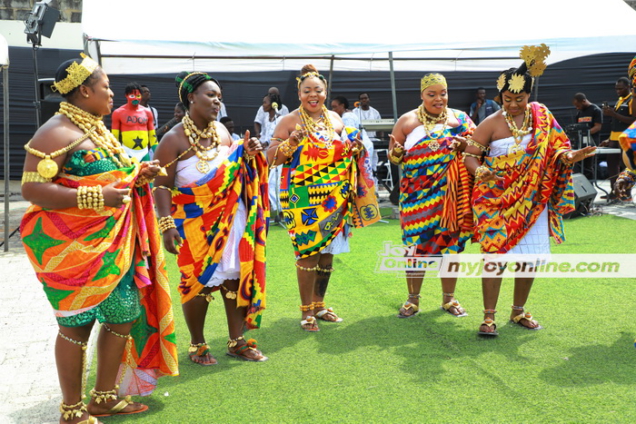Ghana is home to rich and diverse ethnicities, with numerous groups that have coexisted for centuries. These ethnic groups have contributed significantly to the country’s cultural, political, and socioeconomic development. Understanding the ethnic composition of Ghana is crucial in appreciating the nation’s unity in diversity, as well as its historical and contemporary dynamics. This article provides an in-depth analysis of the major ethnic groups in Ghana, their cultural characteristics, historical migration patterns, and their influence on national identity.
Ghana’s ethnic diversity is deeply rooted in history, shaped by migration, trade, and colonial rule. Before colonial times, various ethnic groups settled in different parts of the country, forming kingdoms and states such as the Asante Empire, the Dagbon Kingdom, and the Ga states. The trans-Saharan trade and later the Atlantic Slave Trade played roles in the movement and interactions of these groups.
Colonial rule, particularly under the British, altered the ethnicity by drawing arbitrary borders and introducing new governance systems. While these changes created administrative units and reinforced ethnic identities and divisions, post-independence Ghana has continued to flourish, promoting national unity while respecting ethnic diversity.
Major Ethnic Groups in Ghana Ghana’s population is composed of several ethnic groups, with seven main classifications:
Akan The Akan people form the largest ethnic group in Ghana, making up about 45.68% of the population. They include sub-groups such as the Asante, Fante, Akuapem, Akyem, Bono, and Nzema. The Akan people are predominantly found in the southern and central regions of Ghana and are known for their matrilineal inheritance system, vibrant festivals such as Akwasidae and Fetu Afahye, and significant influence in Ghanaian politics and economy.
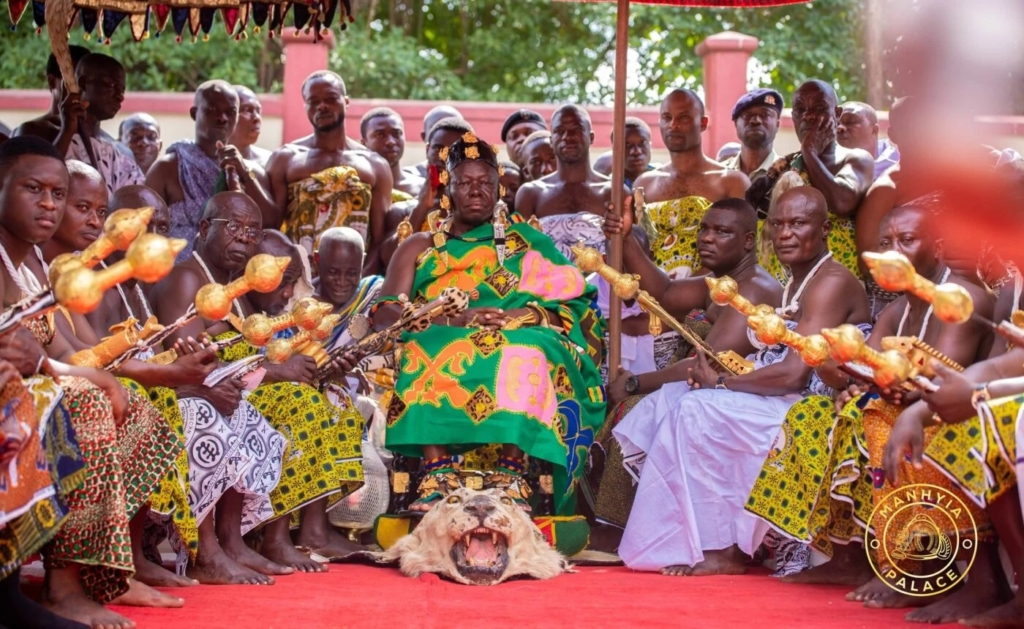
The Asante, for instance, established a powerful kingdom that played a dominant role in Ghana’s pre-colonial history. The Fante, on the other hand, were key players in early interactions with European traders, particularly in the coastal regions. Akan art, particularly Kente weaving and Adinkra symbols, are internationally recognized as integral parts of Ghanaian heritage.
Mole-Dagbani The Mole-Dagbani ethnic group constitutes about 18.5% of Ghana’s population and includes the Dagomba, Mamprusi, and Nanumba peoples. Predominantly found in the Northern Region, they have a strong centralized chieftaincy system and play a crucial role in the history of northern Ghana. Islam is a dominant religion among the Mole-Dagbani people.
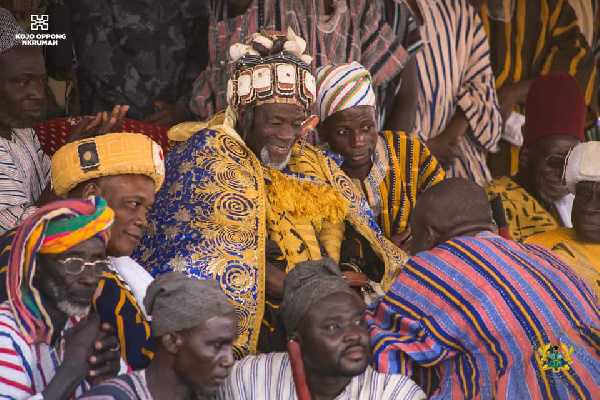
The Dagbon Kingdom, for example, has a well-structured chieftaincy system led by the Yaa Naa, the paramount chief. Their oral traditions, including epic storytelling, serve as a means of preserving history. The Mole-Dagbani people have also contributed to Ghana’s traditional music, with the talking drum playing a significant role in their cultural expressions.
Ewe The Ewe people make up about 12.8% of Ghana’s population and are primarily found in the Volta Region. They have a decentralized political structure with multiple clans led by chiefs. The Ewe are known for their intricate drumming traditions, dance forms like Agbadza, and the celebration of the Hogbetsotso festival.

Ewe history traces its origins to migration from Notsie (in present-day Togo), and their culture is deeply rooted in storytelling, music, and communal practices. The Ewe language has various dialects, and their traditional governance system allows for multiple chiefs ruling different communities while recognizing overarching cultural authorities.
Ga-Dangme The Ga-Dangme group constitutes around 7.06% of Ghana’s population, residing mainly in the Greater Accra Region. They are known for their fishing and trading heritage. The Homowo festival, celebrated by the Ga people, commemorates their historical survival of famine.

Ga society has historically been centered around fishing, trade, and commerce, particularly in Accra, which has evolved into Ghana’s capital city. The Ga-Dangme people have also influenced modern Ghanaian cuisine, with dishes like Kenkey and Banku being popular across ethnic groups.
Gurma The Gurma ethnic group, forming 6.4% of Ghana’s population, resides mainly in the Upper East Region, with some presence in the Northern and Oti Regions. They belong to the larger Gur ethnolinguistic family, sharing ties with related groups in Burkina Faso and Togo.
Key Gurma sub-groups in Ghana include:
Konkomba – Known for their warrior traditions and decentralized governance.
Bimoba – Predominantly farmers, engaged in millet and yam cultivation.
Kusasi – Found mainly in Bawku, with a strong chieftaincy system
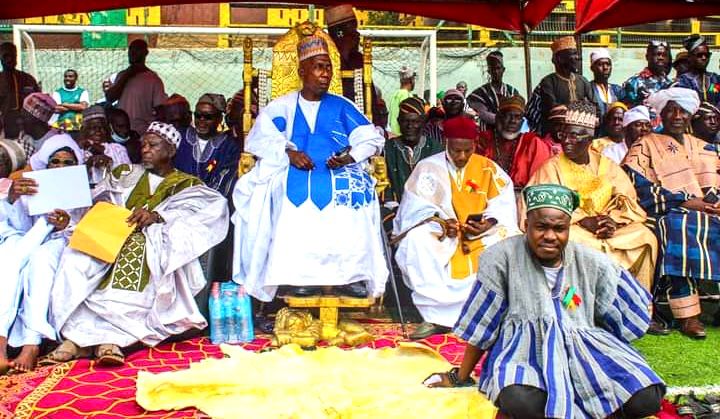
The Gurma people engage primarily in subsistence farming, growing millet, sorghum, and yams, and practicing livestock rearing. Their traditional governance varies, with some groups having structured chieftaincies while others rely on elders’ councils. They celebrate festivals linked to agriculture and warrior history and are known for their rich oral traditions, drumming, and communal dances
Guan The Guan people are one of Ghana’s indigenous groups, found in scattered settlements across the country. They are believed to be among the earliest settlers in Ghana, predating some of the larger ethnic migrations. The constitute 3.22% of the population in Ghana.
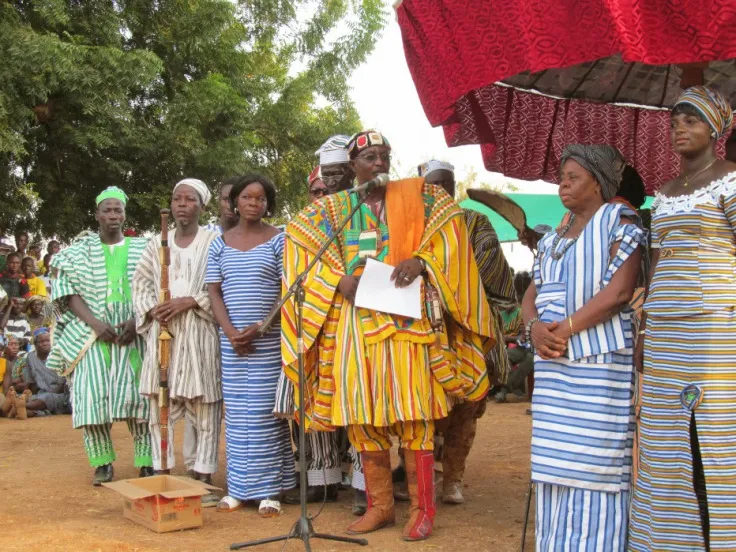
Mande The Mande people in Ghana include groups such as the Wangara (Dyula) and the Bisa/Bussa, primarily found in the northern regions. Historically, the Mande were traders and Islamic scholars who migrated into Ghana through trans-Saharan trade routes.
Wangara (Dyula): Known for their trading skills, they played a major role in the spread of Islam in Ghana.
Bisa/Bussa: Found in the Upper East and Upper West Regions, they are known for their expertise in farming and commerce.
Though smaller in population (1.97%), the Mande groups have contributed significantly to Ghana’s economic history, particularly in trade and Islamic scholarship.
Grusi The Grusi people are a collection of smaller ethnic groups in northern Ghana, primarily in the Upper East, Upper West, and parts of the Northern Region. They are linguistically connected to the larger Gur family but have distinct cultural identities.
Kassena, Frafra, and Sissala: These are some of the most prominent Grusi-speaking groups in Ghana.
They constitute 2.71% of the national population.
Other Minority Groups Other minority groups include the Sefwi, Nzema, and Fulani, each contributing uniquely to Ghana’s cultural mosaic. The Nzema, for instance, are known for their historical role in the resistance against colonial rule, while the Fulani, a traditionally nomadic group, have introduced unique pastoralist traditions to Ghanaian society. Combined, they constitute 1.63% of the national population.
Cultural and Linguistic Characteristics Ghana is home to over 80 indigenous languages spoken across its major ethnic groups. According to the Ghana Statistical Service, 12 of these languages are recognized as major Ghanaian languages of literacy, meaning they are used for reading, writing, and formal education. These languages are Asante Twi, Akuapem Twi, Fante, Nzema, Ga, Ewe, Dangme, Dagbani, Gonja, Dagaare, Kasem, and Gruni.
Traditional practices such as festivals, chieftaincy systems, and rites of passage vary across ethnic lines but collectively shape Ghana’s national identity. The Adae Kese festival of the Asante, the Kundum festival of the Nzema, and the Bugum festival of the Dagomba all reflect the deep-rooted customs and historical narratives of their respective ethnic groups.
Despite these differences, there is significant cultural intermingling due to migration and intermarriage. Urban centers like Accra, Kumasi, and Tamale serve as melting pots where different ethnic traditions interact and evolve, fostering a sense of national identity beyond ethnic divisions.
Socioeconomic and Political Influence of Ethnic Groups Ethnicity influences political alignments, with certain groups historically associated with particular political parties. The Akan, for instance, have had strong ties to political movements such as the United Gold Coast Convention (UGCC) and the New Patriotic Party (NPP), while the Ewe have been closely linked with the Convention People’s Party (CPP) and the National Democratic Congress (NDC).
Economically, different ethnic groups have excelled in various sectors. The Akan dominate cocoa farming, which remains one of Ghana’s major exports. The Ga have historically been traders and fishermen, contributing to Ghana’s coastal economy. The Mole-Dagbani are significant in agriculture and animal husbandry, shaping the economy of northern Ghana.
Regional disparities in development also reflect ethnic settlement patterns, influencing migration and urbanization trends. Many northern migrants move to the south for economic opportunities, leading to a blending of cultures in urban areas.
Ethnic Relations and National Unity Ghana has experienced ethnic tensions, particularly related to land disputes and political competition. However, policies such as the National Commission for Civic Education (NCCE) and inter-ethnic marriages have fostered cohesion. The promotion of cultural festivals and language preservation also strengthens national unity.
Efforts to promote national unity have been made through education, media representation, and inclusive governance. National symbols such as the Black Star and the Ghanaian national anthem emphasize unity beyond ethnic affiliations.
Conclusion Ghana’s ethnic diversity is both a strength and a challenge. While differences exist, they contribute to a vibrant national identity. Promoting unity in diversity, addressing ethnic inequalities, and fostering inter-ethnic cooperation remain essential for national development. Moving forward, a commitment to inclusivity and equal opportunities will ensure a peaceful and prosperous Ghana.
DISCLAIMER: The Views, Comments, Opinions, Contributions and Statements made by Readers and Contributors on this platform do not necessarily represent the views or policy of Multimedia Group Limited.
Tags:


